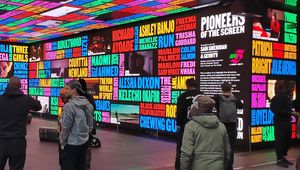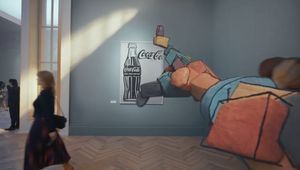
Licence to Dance: How Your Campaign Can Get Into The Groove

Licensing expert Sonia Bouadma is the founder of SB Licensing, which represents the estates of Marilyn Monroe, Muhammad Ali and Elvis Presley, and the legendary photographic archive, Iconic Images.
Sonia was previously vice president, rights services at BENlabs (ex-Greenlight), where she worked on worked on EE 'Six Degrees of Kevin Bacon' (film licensing), Halifax ('Ghostbusters'/'The Wizard of Oz'), Direct Line 'The Fixer' (Winston Wolfe from 'Pulp Fiction'), and Smart Energy GB (Albert Einstein).
Love or hate them, dance sequences have recently taken the advertising world by storm, from KFC’s weird and wonderful ‘Believe in Chicken’ to Gap’s musical 'Get Loose. Now Live' with Troye Sivan. I personally love it when a brand incorporates good choreography into its spot; it puts you in a good mood, makes you feel like dancing, and if done well, it helps you remember the product and brand advertised.
Above: KFC 'Believe in Chicken'
There are different ways to incorporate dance into advertising:
1) Create your own choreography for actors or dancers to perform.
2) Ask a dance crew to create and perform a bespoke routine (as in the case of Gap).
3) Jump on a social media trend. Creators like @smacmccreanor are always coming up with their own fun choreography.
4) Use footage of an iconic personality known for their dance moves: think Elvis Presley and his trademark move the ‘hip swivel’.
5) Tap into nostalgia by licensing IP from a movie or theatre sequence (who doesn’t remember the ‘Pulp Fiction’ dance routine between John Travolta and Uma Thurman, or Kevin Bacon shouting “Let’s dance” in the final scene of ‘Footloose’?)
Above: Gap 'Get Loose. Now Live.'
References to iconic movie routines are particularly abundant – whether directly lifting moves or simply taking inspiration – as preexisting familiarity helps campaigns stick in viewers’ heads. These can be subtle, like John Lewis Insurance’s homage to ‘Little Miss Sunshine’ in its ‘Tiny Dancer’ campaign. Calvin Klein’s 2024 autumn campaign with actress Greta Lee also made subtle nods to scenes from the movie ‘Frances Ha’ and to dance moves from ‘Flashdance’.
If you love movies (as much as I do), you can see references in a lot of spots. Am I the only one who thinks of the scene from ‘A Bronx Tale’ (1993) when young Robert De Niro sees his love interest for the first time in the Amazon Alexa spot 'I Only Have Eyes For You', created by Droga5 London where the couple dances together? Maybe it’s because I love the movie and song so much that I see a reference where there is none… Regardless, the spot resonated with me on an emotional basis and that’s what a brand wants.
Above: Amazon Alexa 'I Only Have Eyes For You'
The next two examples are interesting for licensing the same movie IP with different creative interpretations. In 2020, Burberry used a remastered version of the song ‘Singin’ in the Rain’ and hired dance collective (LA)HORDE to create a beautiful contemporary tribute to the classical American musical. But references can also be more pronounced, and this is what happened when Gene Kelly’s dance routine from the same movie was famously used in the Volkswagen’s 2005 GTI commercial. Using digital techniques to manipulate the movie clip, the advert saw Gene Kelly breakdancing to a remixed version of the song. Cleverly using the slogan ‘The original, updated’, the advert certainly put a smile on my face and left me with a "glorious feeling"at the time; the same emotions I feel every time I watch this movie, which is one of my favourites.
Above: Burberry 'Festive'
But that’s not the first time brands tapped into this feel-good movie for advertising purposes. Growing up in France, I remember fondly the Merinos advert which used both the song and the IP from one of the scenes with the highly energetic dance routine, ‘Make 'Em Laugh’. This advert is from 1987 and Merinos is the only mattress brand I remember from that era. I guess the advert worked.
Using choreography from a well-loved movie may be seen by some critics as a shortcut to creativity, but if the spot combines several elements from the movie in a respectful manner, it can tie a concept together nicely, as Volkswagen demonstrated. Needless to say that there are no shortcuts when it comes to licensing all the IP elements needed to produce such an advert. From licensing the rights to Gene Kelly with his estate, obtaining a licence from the movie studio for the movie copyrights and both the master and publisher for the use of the song, it certainly takes some time, budget and expertise to tie everything together.
Above: Volkswagen 'Singing in the Rain'
Using a movie clip is a straightforward way of capitalising on a well-loved dance sequence if you can use it in its original form or digitally modify it to fit with your creative. But that’s not the only way. In 2022, Wren produced a musical inspired advert produced by ‘The Greatest Showman’ director, Michael Gracey. The all-singing, all-dancing Hollywood style TV advert uses the inspiration of musicals and results in one continuous magical sequence. The spot is also set to the soundtrack of Sammy Davis Jr’s ‘If They Could See Me Now’, from the 1966 Broadway musical ‘Sweet Charity’ and manages to convey the magical style of this art form.
Above: Wren's 'The Great Showman'-inspired commercial
On the other hand, you may want to use a choreographed routine by itself and hire dancers to re-enact it. Interestingly, in some cases, recreating a famous routine even without any references to the musical it was created for can also entail clearances. Several classic Hollywood musical choreographies were created by choreographers who were established in their own right. Take ‘America’ from ‘West Side Story’ – one of its most iconic dance scenes was choreographed by Jerome Robbins. Marilyn Monroe’s ‘Diamonds Are a Girl’s Best Friend’ routine was created by Jack Cole, and ‘All That Jazz’ was choreographed by Bob Fosse. In some cases, choreography may be subject to artistic copyrights protection in the same way a movie clip is protected, and permission from the choreographer may be necessary.
It may sound complex, nitty gritty or niche, but licensing IP is never boring that’s for sure. I would go as far as to say that licensing IP is exciting! Of course, where there’s dancing there’s music… but that’s another type of licence.















